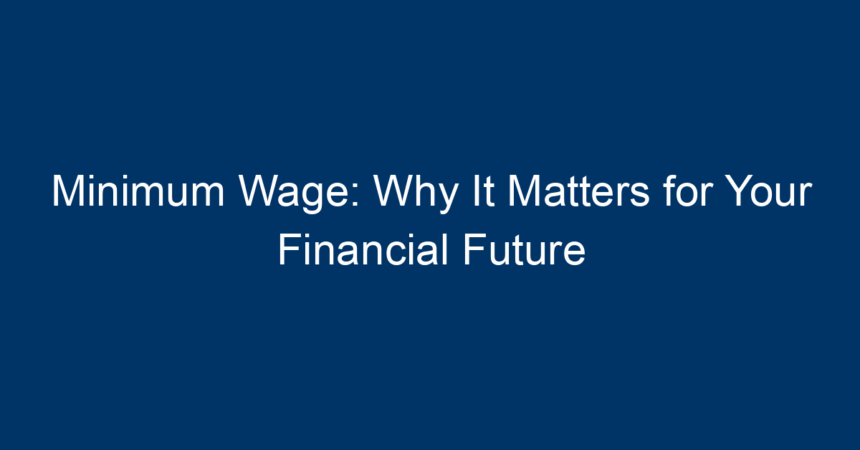Introduction
In today’s economy, understanding minimum wage is not just a matter of policy; it’s a cornerstone of financial literacy and personal growth. Whether you’re entering the job market, managing a household, or planning for retirement, minimum wage plays a pivotal role in determining your financial foundation. This article delves into the importance of minimum wage, examining its impact on individuals and families, the economy, and long-term financial planning.
What is Minimum Wage?
Minimum wage is the lowest amount that employers are legally required to pay workers for their labor. It is designed to protect workers from unduly low pay and ensure a basic standard of living. The minimum wage varies by country, and in some nations, even from state to state or city to city. Understanding this concept can empower you to advocate for fair compensation and make informed career decisions.
The Federal Minimum Wage in the U.S.
In the United States, the federal minimum wage is currently $7.25 per hour, a figure that has remained unchanged since 2009. However, many states and municipalities have chosen to implement higher minimum wages to better reflect the cost of living in their areas. For instance, places like Seattle and San Francisco have set their minimum wages at $15 per hour or more. These disparities highlight the ongoing debate around minimum wage laws and their relevance to today’s economy.
The Importance of Minimum Wage
Understanding minimum wage matters for several reasons, each impacting how we manage our finances.
1. Economic Stability
Minimum wage laws contribute to economic stability by ensuring that workers receive a baseline income. When workers are paid fairly, they have more disposable income to spend, driving economic growth. Increased consumer spending stimulates businesses, creating a positive feedback loop that benefits everyone.
2. Reducing Poverty Levels
Raising the minimum wage can alleviate poverty for many families. When individuals earn a living wage, they can afford basic needs such as food, shelter, and healthcare. This can lead to reduced reliance on government assistance programs, benefiting society as a whole. Studies have shown that raising the minimum wage can significantly decrease poverty rates, leading to healthier communities and improved quality of life.
3. Boosting Employee Morale and Productivity
Employers who pay their workers a fair wage often see improved employee morale, retention, and productivity. Happy employees are more likely to be engaged and motivated, leading to better performance. This creates a win-win situation for both employers and employees, ultimately benefiting the economy.
How Minimum Wage Affects Your Financial Future
1. Career Choices
Understanding the intricacies of minimum wage can significantly influence your career decisions. If you’re aware of the minimum wage laws in your area, you can seek jobs that not only pay above this baseline but also offer growth opportunities. This foundational knowledge equips you to negotiate better salaries and benefits, shaping your financial future.
2. Skill Development
By recognizing the importance of minimum wage, you can make informed choices about investing in your education and skill development. Higher-paying jobs often require specific skill sets or degrees, and knowing where the wage thresholds lie can guide your educational pursuits. Investing time and resources into learning valuable skills can lead to upward mobility and financial security over time.
3. Cost of Living Adjustments
Minimum wage also plays a crucial role in understanding cost of living. As minimum wage increases in certain regions, it’s essential to consider how this affects local prices for housing, utilities, and groceries. Adjusting your financial plan with these factors in mind can ensure that you’re not just making ends meet but thriving in an increasingly expensive world.
The Ongoing Debate on Minimum Wage Increases
The discussion surrounding raising the minimum wage is both nuanced and multifaceted. Advocates argue that increasing the minimum wage helps lift families out of poverty and stimulates the economy. Critics, however, claim it could lead to job losses and increased prices for consumers.
Research on Minimum Wage Effects
Numerous studies have explored the effects of minimum wage increases, often yielding mixed results. While some economists argue that job loss can occur, others note that the benefits to worker spending and quality of life often outweigh the negatives. Understanding the breadth of this research can help you form your own opinion and may influence your career or investment decisions.
Actionable Insights for Financial Planning
1. Budgeting Wisely
Regardless of wage laws, effective budgeting is essential. Track your income and expenses meticulously—especially if you’re working for minimum wage. Utilize budgeting tools and apps to keep your finances in check, helping you allocate funds for savings, emergencies, and discretionary spending.
2. Advocating for Your Worth
Whether you’re a seasoned professional or just starting out, don’t hesitate to advocate for your worth. Research industry standards and understand what others in your field are earning. Bring this information to the negotiating table during job interviews or performance reviews.
3. Investing in Yourself
Consider furthering your education or learning new skills relevant to your desired career path. This investment can often yield significant returns in terms of salary increases and job opportunities, particularly as you move beyond minimum wage positions.
4. Staying Informed
Regularly educate yourself about changes in minimum wage laws, both locally and nationally. Being informed not only empowers you as an employee but also enables you to plan better for potential shifts in your financial landscape.
Conclusion
Minimum wage is not just a number; it’s a fundamental component of economic security and personal financial health. Understanding its importance can influence your career choices, spending habits, and overall financial strategy. By staying informed, advocating for fair wages, and investing in your future, you can navigate the complexities of minimum wage and build a secure financial future.
Call to Action
Are you maximizing your earning potential? Start advocating for fair wages today—research your local minimum wage, understand your rights as a worker, and don’t hesitate to negotiate your salary. Your financial future is in your hands, and it starts with recognizing the value of your work.




